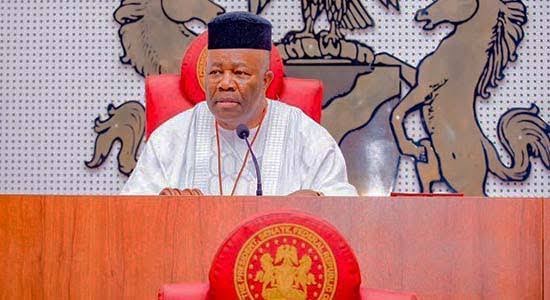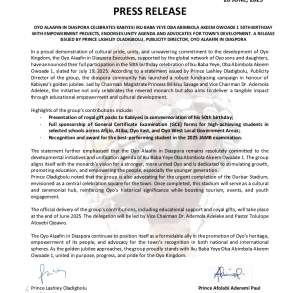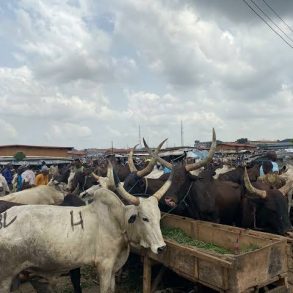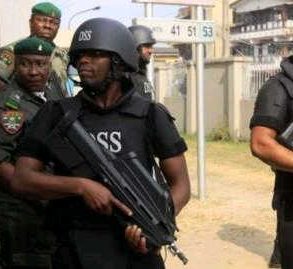The Senate President, Godswill Akpabio, on Monday gave his support for the creation of state police across the country.
Akpabio expressed his support in Abuja at a national policy dialogue on state policing organised by the House of Representatives Committee on Constitution Review.
The event which attracted prominent Nigerians, including former military Head of State, Gen Abdulsalami Abubakar (retd), ex-President, Goodluck Jonathan, Metropolitan Catholic Archbishop of Abuja, Cardinal John Onaiyekan, among others, dwelled on the theme, “Pathways to peace: Re-imaging policing in Nigeria.”
Represented by the Deputy Senate President, Jibrin Barau, Akpabio pledged the readiness of the 10th Assembly to confront the challenges of insecurity headlong in line with the focus of the President Bola Tinubu-led administration to make Nigeria safe for all.
He said, “The concept of state police has been a topic of debate for many years. It is a complex issue with no easy answers. But today, courtesy of the House of Representatives, we have the opportunity to engage in a national dialogue, to listen to the voices of our fellow citizens, and to forge a path towards a more secure Nigeria. Let us seize this opportunity with open hearts and open minds. Let us listen to one another, learn from one another, and work together to find a common ground.
“President Tinubu did not only come to steady the ship of state, he came to adjust the sails and steer the ship of state through rough and fair weather, to the right direction and the right destination. He is known for rearranging the sails, and this is exactly what he has done in agreeing that modalities should be worked out for us to have state police.
“In working out modalities for the state police and the security of our nation, we must not forget that security is not a privilege, but a fundamental right of every Nigerian. It is our duty to ensure that this right is upheld, that justice is served, and that the rule of law prevails.
“We must build a security architecture that is robust, transparent, and accountable. If we are to set up state police departments, we must ensure that they are free from the shackles of politics, religious extremism, tribalism, and ethnicism. We must empower them to serve and protect, without fear or favour.”
He noted that if established, state police must not be used for the fulfilment of private privileges, saying, “Let us never forget that the power of the state police should never be used as a tool of oppression or witch-hunting.
“Let us ensure that political powers do not manipulate the state police to silence dissent or target their enemies. Let us ensure that the influential do not exert undue influence over the state police and that justice is blind to wealth, power, politics, or status. Let us build a system that is fair, just, and equitable for all,” he added.
In his keynote address, Speaker of the House of Representatives, Abbas Tajudeen, said the role of the National Assembly in security law-making was to ensure that any initiative, such as establishing state policing “Adheres to our constitution and aligns with the broader goals of national security and public welfare.”
He further stated that the parliament had no position on state police, stressing, however, that “Our role is to facilitate a dialogue and generate consensus.”
The speaker continued, “Creating state policing systems requires more than just legislative action; it requires a national consensus. As diverse and complex as our great country is, so too are the opinions and perspectives on how best to manage and implement local policing.
“The concept of state police involves decentralising law enforcement functions to the state level, thereby allowing for more localised and responsive policing tailored to the unique needs of each State,” stressing, however, that “Section 214 of the 1999 Constitution establishes the Nigerian Police Force as unitary police “For the federation or any part thereof”.
Abbas added, “Evolving security challenges and other institutional and structural challenges have severely affected the general effectiveness of the police. This deficit has resulted in the military engaging in policing functions in all States of the Federation, including the Federal Capital Territory.
“In turn, this has also overstretched the armed forces and affected their effectiveness in combating other broader security challenges, including those that threaten the territorial integrity of Nigeria.”
In his remarks, the deputy speaker of the House of Representatives, Benjamin Kalu said over N5bn had been lost to kidnappers in ransom payment in the past eight years.
Kalu who chairs the House Committee on Constitution Review stressed the importance of altering the 1999 Constitution (as amended) to create a state police, stressing that the Nigeria Police Force faces many challenges impeding the effective discharge of its responsibilities.
He said, “Since 2016, estimates suggest that over ₦5bn have been paid in ransoms to kidnappers, a figure that starkly exposes the alarming growth of this criminal enterprise in the country.
“The 2024 Global Terrorism Index paints a concerning picture, ranking Nigeria fourth in sub-saharan
Africa and eighth globally for countries most impacted by terrorism.
“These statistics underscore the urgent need for a multi-layered policing approach that prioritizes local security and enables a more responsive policing environment in Nigeria.”
Stakeholders present at the event expressed support for state police, warning however that it must be immune from the manipulation of state governors for political purposes.
[4/23, 1:22 PM] Adesoji Tyt Staff: Nigerians Should Be Enraged With Political Leaders Diverting Public Funds To Send Children To N42million Private Schools – Sowore
Sowore in a post on X on Monday said that Nigerians should be enraged at the political class in the country for diverting public funds to send their children to expensive private schools including the Charter House School in the Lekki area of Lagos State where they pay as high as N42million per annum while they left public schools in ruin.
Human rights activist and presidential candidate of the African Action Congress (AAC) in the 2019 and 2023 general elections, Omoyele Sowore, has berated Nigerian political leaders for ruining public education in the country.
Sowore in a post on X on Monday said that Nigerians should be enraged at the political class in the country for diverting public funds to send their children to expensive private schools including the Charter House School in the Lekki area of Lagos State where they pay as high as N42million per annum while they left public schools in ruin.
Sowore added that the politicians who diverted public funds and impoverished Nigerians do not only use the diverted funds to send their children to expensive private schools but also build mansions for themselves.
Attaching photos of Charter House Primary School on his X post, the #RevolutionNow convener said, “These are the classrooms and campus of the @Charterhouselag School, a primary school in Lagos’s Lekki area, charging N42 million per annum.
“The people paying for their kids to attend this school are some of the same people building substandard school classrooms across Nigeria.
“What should not be lost on Nigerians is that these classrooms ought to be donning our public schools as the sixth largest oil-producing country in the world.
“The outrage should actually be against the Nigerian political class that ruined public education institutions and diverted the funds from there to send their own kids to expensive private schools and also build themselves mansions that are swankier than the classrooms you see here.”
23rd April, 2024






